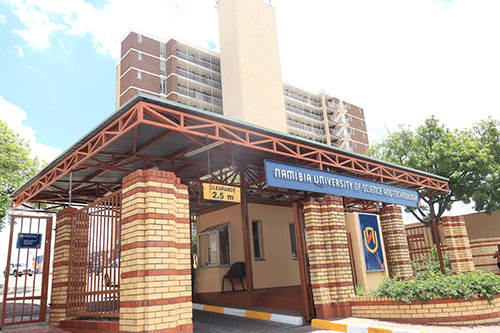A crisis meeting by the Namibia University of Science and Technology council to address various allegations of impropriety ended in a cul-de-sac.
This is because council members failed to reach consensus on an envisaged investigation.
The council held a meeting yesterday on the allegations, and to map a way forward. NUST’s council is the institution’s supreme policymaking body, headed by banker Florette Nakusera.
The meeting, this paper is reliably informed, ended in chaos with council members walking out.
Reliable sources briefed on the issue said the council was divided on whether or not the NUST management should spearhead an investigation implicating members of the executive.
Due to Nakusera’s refusal to have management excused from the discussions involving them, council members walked out and vowed to request the minister to intervene as “the university’s governance has collapsed”, said a source close to council.
In recent weeks, the university has enjoyed publicity, predominantly for the wrong reasons.
The meeting comes at the back of New Era’s reportage of alleged nepotism, a lack of accountability for public funds, wanton disregard to the country’s labour laws, and alleged abuse of power by management.
In the latest article which was carried in Wednesday’s edition, New Era reported that the Namibia Public Workers Union was against a NUST council decision to allow the university’s management – accused of committing wrongdoings – to investigate themselves.
In a fresh twist of events, anonymous NUST employees reached out to higher education minister Itah Kandjii-Murangi, pleading for her intervention.
“As our line minister, why are you remaining numb on the current issues at NUST? Who are you protecting? What are you afraid will be exposed – the incompetence in the system and complacency with the corruption?
“Why are you not demanding for NUST’s financial statements and annual reports to be submitted, as prescribed by the Act? How is it possible that a public institution can get away with non-compliance under your watch? On what basis do you support their funding?
“Please explain why NUST has not been audited for four years. Who are the auditors, and where is the audited information?”, asked the employees.
Kandjii-Murangi is out of town on official business, and was not comfortable to comment.
She, however, emphasised that NUST is independently run from the ministry. It is the council that should deal with the current developments, the minister said.
She further noted that if necessary, she will advise the council and management, but only after she had established the facts.
Council is expected to update the minister on the outcome of their meeting today.
NUST spokesperson Johannes Haufiku yesterday complained to this reporter that the university was never afforded ample time to respond to questions prior to the publication of recent articles.
However, at the time of going to print yesterday, questions the newspaper sent to Haufiku, NUST vice chancellor Erold Naomab and Nakusera more than two weeks ago had not been responded to.
Moreover, the university neither responded to questions sent on Tuesday.
“I spoke to the NEPC editor and managing editor to say we need eight to 12 hours to respond to complex issues. If we are being contacted and given four hours to respond while we’re busy with other commitments, I am not going to consider that we are having a relationship that exists in good faith”, he stated.
Among the allegations New Era wanted the university to shed light on were the alleged delayed job-grading process, dating back to 2019. The process, the union claims, was done in secrecy, with no stakeholder engagement, which is a serious contravention of the Labour Act, NUST HR policy code and governance principles.
NUST has seemingly also failed to account for taxpayers’ monies entrusted to it. The last time NUST released an annual report was in 2018.
Out of the total N$3.83 billion budget allocation to the higher education ministry for the 2023/24 financial year, a total of N$995 million is earmarked for the University of Namibia, N$509 million for NUST and N$1.6 billion for the Namibia Students Financial Assistance Fund (NSFAF).
Out of the N$500 million budget allocated to NUST, approximately 70% goes into salaries.
This translates into NUST spending about N$350 million on salaries and related expenditures.
– emumbuu@nepc.com.na


